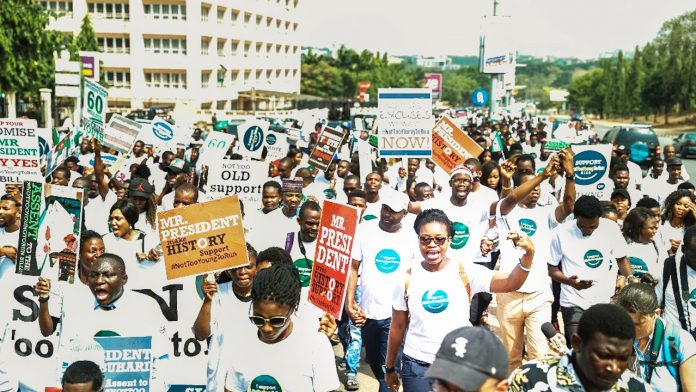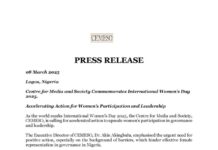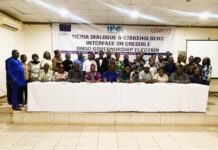The dawn of this week signaled the celebration of youths as Sunday, August 14 was the International Youth Day, a day designated by the United Nations (UN) to celebrate young individuals across the world.
The theme for this year’s commemoration was ‘Safe Spaces for Youth.’ According to the UN, youth need safe spaces where they can come together, engage in activities related to their diverse needs and interests, participate in decision-making processes and freely express themselves.
UN Secretary-General, António Guterres, in his message to mark the day called on governments across the world to ensure safe space for youths, noting that world’s peace, economic dynamism, social justice, tolerance depends on tapping into the power of youth.
In Nigeria, as the country counts down to 2019 general elections, the issue of safe space for youths in the political arena has been brought to the front burner. There have been renewed calls for youth inclusiveness in governance.On Tuesday, NOIPolls released the report of a survey titled: The preferred age for the 2019 presidential candidate. According to the survey, 35 per cent want young candidates, 48 per cent want middle-aged candidates and a paltry 10 per cent want elderly candidates.
On the maximum age preference for the next presidential candidate, seven per cent choose between 18 and 39 years, 64 per cent went for 40 to 50 years, 15 per cent for 51 to 60 years, eight per cent prefer candidates aged 61 and above, while six per cent of respondents were simply indifferent.
The survey went ahead to state the major factors militating against young professionals from contesting for public office: 40 per cent claim financial constraints, 23 per cent fingers god-fatherism, 15 per cent say lack of experience, for 10 per cent of respondents, it is lack of political platforms, five per cent identified corruption and five per cent said insecurity.
From the above statistics, the odds are stacked against the youth barely six months to 2019 elections. Since the earliest civilization, the young, virile and resilient members of the society had always borne the burden of giving a fresh start to an already disenchanted hope, for on their shoulders lie the dream of restoring hope and lost opportunity to the next generation.
But Omoyele Sowore, publisher of Sahara Reporters and presidential candidate of African Action Congress (AAC) must have spoken the minds of many Nigerian youths years ago when he said: “In my home country, the elders gathered together today, they looked at the young people and decided to grant them only one day; they choose tomorrow of all days for the youth to lead, then they called the youths leaders of tomorrow, knowing that tomorrow is just a day that no one will ever see.”
The truth is that young people across the world are taking over power and leadership positions from the older generation of politicians. A list of world’s youngest leaders from democracies, monarchies, and dictatorships in Eastern and Western Europe, Asia, and the Middle East names Emmanuel Macron of France at 39 the oldest. He is followed by President of the Supreme Political Council of Yemen, Saleh Ali al-Sammad, 38; Acting Prime Minister of the Republic of Macedonia, Emil Dimitriev, 38; Druk Gyapol (King of Bhutan), 37; Jigme Khesar Namgyel Wangchuck, 37; Emir of Qatar, Tamim bin Hamad Al Thani, 36; Supreme Leader of North Korea, Kim Jong Un, 34; while the youngest and only woman on the list is the Captain Regent of San Marino, Vanessa D’Ambrosio who is 29.
However, in spite of global trends, Nigerian youths seem lost in the picture of the future. For long, they have been relegated, forgotten and abandoned in issues of governance. Notwithstanding, the youths say they are determined to challenge the status quo and raise a voice against the epileptic leadership that has been witnessed over the years, which has stunted the growth and development of the country despite the nations enormous human and natural resources.
Civil Society Organizations (CSOs), youth groups, students and other stakeholders in the new Nigerian dream recently have been involved in a series of engagement to end leadership recycling in the country.
Bodies such as Youth TakeOver Movement, Not Too Young To Run, Nigerian Youth Decide, 50 below 50, 67 million youths movement, G37 Coalition, Reformed Youth Movement, Our Mumu Don Do, NANS, NYCN, Connected Development among a host of others, have been on the field and social media, mobilizing young people towards the paradigm shift.
The signing of the #NotTooYoungToRun bill into law by President Muhammadu Buhari, which altered Section 65, 106, 131, 177 of the 1999 Constitution of the Federal Republic of Nigeria (as amended) to reduce age qualification for president from 40 to 30; governor from 35 to 30; senator from 35 to 30; House of Representatives membership from 30 to 25 and state House of Assembly membership from 30 to 25, further justifies the timing.Chairman of the Independent National Electoral Commission (INEC), Prof. Mahmood Yakubu, rightly predicted that Nigerian youths, with their population, could determine the outcome of general elections.
During a courtesy visit to the management of Bayero University, Kano (BUK), host of the INEC Youth Votes Count Campus Outreach Initiative, Yakubu revealed that judging from the figures emanating from the ongoing Continuous Voter Registration (CVR), coupled with the voting pattern noticed in the 2015 general elections, youths currently constitute a sizeable percentage of the total population of registered voters that could be a game changer.“By the time we suspend the CVR exercise on August 31, the number of registered voters will be well over 11 million. If we add this to the existing Voter Register of 70 million, and by the time we go into the 2019 general elections, we would have had over 80 million voters.
“From what we are seeing so far in the ongoing CVR, 2019 is going to be the year of the youth. Quite a large number of those that have registered to vote are youths, meaning those between the ages of 18 and 35. When we did the analysis of the 2015 presidential election results, the youths also played a very important role,” he added.
This however does not translate to the number of youths willing to get involved in electioneering process by voting or being voted for. It also does not justify the fact that the older generation of politicians are not ready to leave the helms of affair for the yet-to-be-ready youths. Buhari after signing the bill in May warned that the youths should only get prepared after learning in 2019, so as to be fit in 2023 when he must have completed his second tenure, as anticipated.
Hinting on the challenges that may deter their utmost performance in the forthcoming elections, author of the book, My Nigerian Dream and convener, Youth Take Over Movement & G37 Coalition, Gabriel Ashibi, said the major challenges of the youths is that of funding and synergy as they have great ideas and strategies but lack the requisite funding to achieve their dreams.
According to him, the elite class has deliberately hijacked the opportunities that could empower young people in order to leave them at their mercies and be available to be used anytime they call, noting that funding is the key to elections success. The youths are ready but funding is the biggest challenge facing them.“Another big challenge is that of synergy. Young people have not mastered the game of synergy/alliances in the game of politics. They prefer to work alone. Everybody wants to be National Coordinator. I am fully involved in the G37 Coalition, a network of young people with the aim of bringing all youth groups into one fold to form a common power bloc. As laudable as the idea sounds, it has been very difficult to convince youth leaders to embrace the initiative. It is clear that young people are not ready to unite irrespective of backgrounds and other differences to take over power.”
A young presidential aspirant, Prince Eniola Ojajuni, noted that the social media, which has become the biggest tool for electoral victories, is largely dominated by young people and they can capitalise on it to woo the electorates to their favour.He lamented that while the youths control the majority of votes cast during elections, they end up controlling nothing after politicians win elections, hence the need for them to unite, form a front to knock out the old leaders.
National Coordinator, National Youth Party, Adebayo Omotuyi, said the reality of youths emergence may be stunted if all young people have their eyes fixed on the presidency without interests in other elective positions, especially the National Assembly and state legislative houses.“Too many young persons want to be president. Only one person can occupy the office. So while the older politicians are retaining their numbers between the two main parties, youths are busy splitting in ranks. If we must make any meaningful impact in the coming elections, we must find a way to come together and confront the political status quo as one movement of all young persons in Nigeria.”
“We young people need to take our destinies in our own hands. First, let more youths show interest in political positions and let’s unite in voting these drama kings/queens out of office by voting in more serious minded and competent youths in 2019. Finally, we must know that our desire for a true change lies with our PVCs and exercise of our voting rights. Let’s change the course of things by getting our PVCs and turning out en masse to vote and concentrate less on social media”, he advised.
















